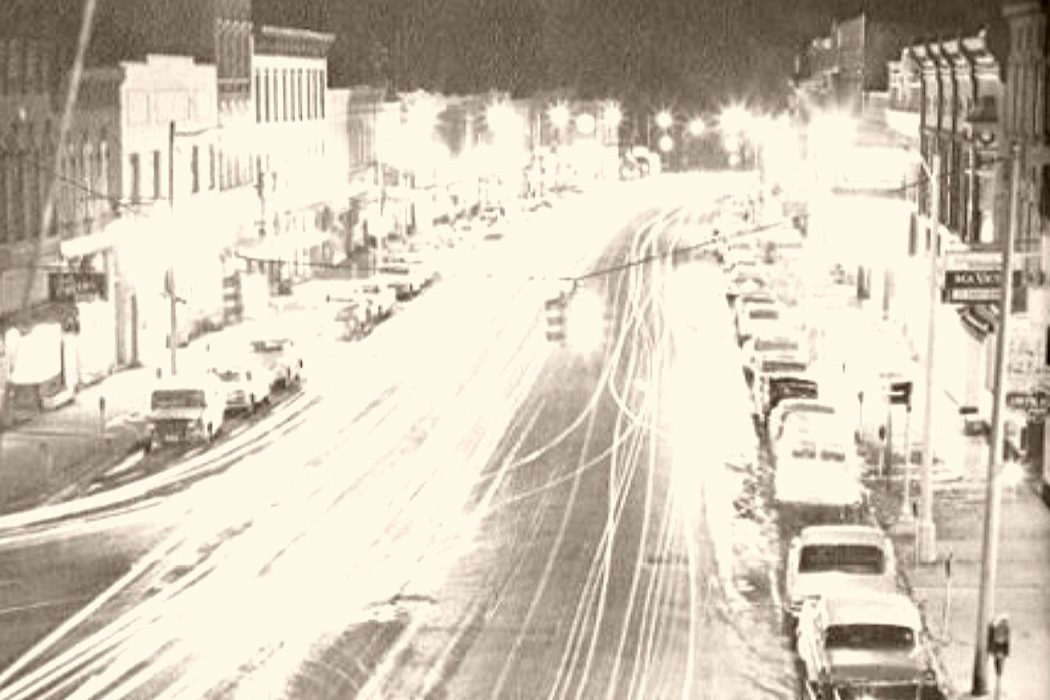She never ceased to wonder at the incredible power of birds for adaptation. These had flown perhaps a thousand miles from the South to raise their families in the northern prairie. Some people thought migrations were a habit left over from the Ice Age, but nobody really knew why birds migrated. Why didn’t they just stay in the South all the time? Perhaps it was their migrations that kept them hardy and pliable and able to survive drastic changes in the world. Perhaps people ought to migrate too, and never strive to put down roots at all. It often seemed to her that the desire of human beings to own land was the cause of all their troubles. Their desire kept them enslaved, from one generation to the next. Yet how would a human being know who he was, without roots?
Lois Phillips Hudson, The Bones of Plenty
This past week, I worked a shift at World Fare, the volunteer-run fair trade store that operates out of the Victorian-era storefront beneath my home in a building my husband and I own. It was a remarkably cold day with a stiff wind, and Cliff, one of our walkers from a neighborhood group home, came in three times in the first 45 minutes of my shift, once for coffee and twice just to warm up. Each time he passed through the heavy front door, I had to get up to close it tight against the wind, an issue with the threshold hanging it up about two inches from being shut. Add that to the long list of repairs on a 150-year-old building.
The sixth time I forced the old door shut with the full force of annoyance, I startled a young man walking past the shop, and watched through the front windows as he turned around to come inside—just curious, and perhaps also looking for respite from the relentless wind driving through his Patagonia fleece. “Do you guys have brewed coffee?” In fact, we do, and we got to chatting as he looked around.
A sophomore at a state university, he had grown up in our small city of Three Rivers and was back in town for spring break. Knowing he was heading to Germany for the summer, something pulled him out of the house to explore downtown. He’d already walked through the Carnegie Center for the Arts where he hadn’t been since… “Fourth grade?” I asked, which was when every class in the district took a field trip to the Carnegie. “Yeah, probably,” he said, with a culpable smile. Though he grew up within walking distance of downtown, he’d never been in World Fare, which celebrated its thirteenth anniversary last August.
Knowing the trend of youth migration out of Three Rivers and hoping I wasn’t being too interrogative, I asked him what local institutions his family was connected to. I’m always curious what patterns of family life look like that seem to completely circumvent downtown, which I consider to be the heart of our community. He couldn’t think of anything except the school system. Does he see himself moving back to Three Rivers after college? No, probably not. Cue the same smile.
“I’m trying to give up coffee,” he said, as he set his empty cup on the counter with a box of green tea, and I wondered if that $5.50 charge on our Square account would be the last mark he’d leave on this shop. We exchanged names and handshakes—“Yeah, nice to meet you, too!”—and he left, kindly pulling the front door shut behind him.
And would you believe I had almost the exact same conversation with someone else that same day before the end of my shift? This was a prearranged coffee meeting with a new acquaintance, but the similarities were remarkable: a college-educated person in his early twenties, majored in the sciences, back in the area for a time, grew up within easy biking distance of downtown but never spent much time here, family primarily engaged with the local schools and their church, but not much else.
In his essay that will come out in Topology on Wednesday, Ched Myers quotes Canadian regional planner Glenn Albrecht to define solastalgia: “the pain experienced when there is recognition that the place where one resides and that one loves is under immediate assault” or “a form of homesickness one gets when one is still home.” As I’ve reflected on this issue theme throughout the week, I’ve notice myself experiencing a sort of pre-emptive solastalgia for Three Rivers. What will become of our place if so many people who should have a deeply rooted, DNA-level affection for our city continue to leave?
And yet, I wear my own culpable smile: Three Rivers is not where I grew up. My home place was Highland, Indiana, in the south suburbs of Chicago, before the back yards on our block were all fenced off and before the strip of woods between our house and my grandparents’ was wiped out to make way for a forest of McMansions. I grew up frolicking in the fields at Zandstra’s Farm before the invasive species of big box stores and condos edged out the onions and peppers. I did not stick around to start a garden, dismantle a fence, or cry, “Enough!” Perhaps my penance for leaving is the perpetual ache of my heart for a place everyone else is determined to leave.
But if there is true repentance in my posture, it needs to go back much further than my own exodus from Highland, Indiana. Though Three Rivers: The Early Years devotes almost all of its pages to ennobling the early white settlers who cleared and platted the area where I live now, a few words at the beginning offer a record of the people who occupied this “wilderness” in what I guess must have been the early-early years. Reading between the parallel lines of the story—the friendly, harmless Indians or the fearsome Chief Blackhawk and his warriors—there’s a deep grief over the result of trusting the European immigrants to live peacefully side-by-side. Chief Cush-ee-wees of the Pottawatomie is quoted as saying, “We have so little, they have so much…why do they want ours?” Juxtapose this with the chirpy report of the first schoolhouse, founded around 1832 and run by a one-armed teacher who would whip the mischievous boys with their heads secured between his knees:
The thirty students would watch with apprehension as Indians traveled past the school on their way to the trading post. It was still a wilderness, but the pioneers could say:
Here, in this rich land, we found no man need serve another.
Here, any man with ox and gun could live, clear his own fields, hew his own home, win for himself a birthright—independence.
Here, in these row clearings, stirred ideas.
Here, in this rich wilderness, we dreamed of a good life, a life of happiness for every man.
In the meantime,
In the Chicago treaty of 1833, Gov. Porter tricked the Indians with slick promises and the Pottawatomies sold the reservations…. In 1840, General Brady, with troops from the United States Army, rounded up the Indians and moved them across the Mississippi. Some Indians not willing to move hid in the forest until the soldiers were gone but their power and land was gone.
The St. Joseph River valley was a choice spot. The fertile prairies were covered with grass four or five feet high. The soil was rich and deep and forests of hard wood trees so dense the sun scarcely came through. It was wild land, untamed.
Yes, children, the land itself was to blame because, well, did you see the way it was dressed? This version of the story is not unusual. In every place throughout this emerging country, it was a time of radically re-defining what was meant by “we,” of wrenching apart words from the practices they would seem to engender—a process that continues to this very day. Summarizing his plans in a speech to Congress on February 28, 2017, President Donald Trump concluded,
When we have all of this, we will have made America greater than ever before, for all Americans. This is our vision. This is our mission, but we can only get there together. We are one people, with one destiny. We all bleed the same blood. We all salute the same flag. And we are all made by the same God. And when we fulfill this vision; when we celebrate our 250 years of glorious freedom, we will look back on tonight as when this new chapter of American Greatness began.
The time for small thinking is over. The time for trivial fights is behind us. We just need the courage to share the dreams that fill our hearts, the bravery to express the hopes that stir our souls, and the confidence to turn those hopes and dreams to action. From now on, America will be empowered by our aspirations, not burdened by our fears; inspired by the future, not bound by the failures of the past; and guided by our vision, not blinded by our doubts. I am asking all citizens to embrace this Renewal of the American Spirit…
Given our history as a country, I have to wonder what every U.S. president has meant by “we,” and our current national context of wall-building, immigrant-shaming, and healthcare-eroding only puts even more distance between the language and the praxis.
Turning my attention back the conversations at World Fare after revisiting the early years of Three Rivers, I see my original question from another angle: “What will become of our place if so many people who should have a deeply rooted, DNA-level affection for our city continue to leave?” The fact is, it was my extended family of immigrant settlers who set this pattern into motion, a pattern that continues today: speak the words of peace and nurturing while engaging in practices of impoverishment and dislocation. Grieve the impending transformation of “our” place as if we are not the heirs of stolen goods.
Reviewing the story of my afternoon in World Fare, I realize I was looking at the wrong part of the map in trying to discover a path out of solastalgia. I was focusing on the problem of youth out-migration embedded in the stories of the two young men, when I should have been looking at Cliff, who stays because he has no choice, and is more my compatriot in roots than many of those who share my education and income status. Just like trees communicate with each other through extensive networks of roots and fungi systems, I need to listen to my nearby neighbors with more than just my ears to discern a Spirit that is far older than the country where I happen to have been born a citizen.
Long after the $5.50 charge for green tea has cleared, Cliff will be leaving whatever change or cans he found on the ground in exchange for his coffee and a place to belong once, twice, ten times a day, depending on the weather. These sidewalks, rarely walked by mobile young men of privilege, are more home to Cliff than most of us. Here I’d been worrying about how to get the door to shut behind him, rather than making sure the door will always open before him.




